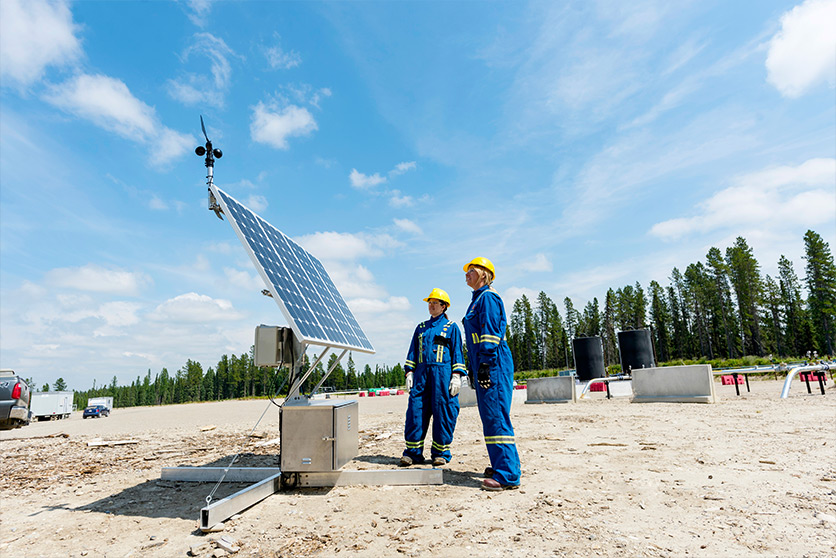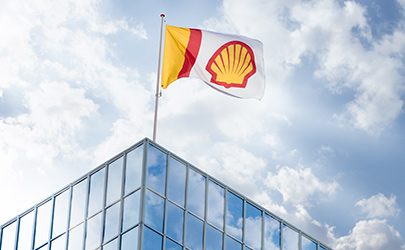Environmental, social and governance
Our success in business depends on our ability to meet a range of environmental and social challenges. We must operate safely and manage the effect of our activities on neighbouring communities and wider society. This is central to the responsible delivery of energy. If we fail to do this, we may incur liabilities or sanctions, lose business opportunities, harm our reputation, and then risk our licence to operate.
Today, society faces one of its toughest challenges: how to provide more energy to a growing world population, while also reducing GHG emissions that contribute to climate change and air pollution.
Shell fully supports the goal of the Paris Agreement: to keep the rise in the global average temperature this century to well below 2°C above pre-industrial levels and to pursue efforts to limit the temperature increase even further to 1.5°C.
Shell supplies around 3% of the energy the world uses and wants to play its part in the global effort to tackle climate change.
Net Carbon Footprint
In 2017, Shell announced a long-term ambition to reduce the Net Carbon Footprint of the energy products we sell, in step with society’s drive to reduce GHG emissions as it moves towards the goal of the Paris Agreement. We aim to reduce the Net Carbon Footprint of the energy products we sell – expressed in grams of carbon dioxide (CO2) equivalent per megajoule consumed – by around half by 2050, and as an interim step, by 2035, we aim for a reduction of around 20% compared with our 2016 level, both predicated on societal progress.
To operationalise this long-term ambition, in December 2018, we committed to set specific Net Carbon Footprint targets for shorter-term periods. Each year a target will be set for the next three- or five-year period. The target-setting process started in 2019 and will run to 2050.
In early 2019, it was decided to set a Net Carbon Footprint target for 2021 of 2-3%, and in early 2020, to set a Net Carbon Footprint target for 2022 of 3-4% lower than our 2016 Net Carbon Footprint of 79 grams of CO2 equivalent per megajoule.
We have received third-party limited assurance on our Net Carbon Footprint for the years 2016 to 2019. For 2019, our Net Carbon Footprint was 78 grams of CO2 equivalent per megajoule. The reduction in our Net Carbon Footprint was due to an increase in sales of electricity in markets with declining grid carbon intensity, and growth in customer demand for carbon-neutral product offerings.
An energy transition condition has been included in the performance conditions for the 2019 Long-Term Incentive Plan award. It is focused on Shell’s strategic ambition to thrive in the energy transition and supports delivery of Shell’s Net Carbon Footprint ambition.
Sectoral decarbonisation
As an energy supplier, Shell’s focus is on selling a mix of energy products with a progressively lower carbon intensity. But any attempt to address climate change on those grounds alone will not succeed. This is because changing the mix of energy products is only one of the ways to reduce global GHG emissions. It is also true that Shell can only sell products that people and companies are willing to buy. Demand comes from consumption patterns driven by individual consumer choices and the needs of key sectors of the global economy.
Shell has started working with energy use sectors to help optimise the decarbonisation of their demand. This includes Shell joining, in September 2019, the Mission Possible Platform and signing up to related sectoral initiatives:
- Clean Skies for Tomorrow, which is working towards a transition to sustainable aviation fuels as part of a meaningful and proactive pathway for the industry to achieve carbon-neutral flying;
- Global Maritime Forum’s Getting to Zero Coalition, which is working towards the goal of getting commercially viable zero-emission vessels into operation on deep-sea trade routes by 2030; and
- Shell also participates in two related workstreams: the Collaborative Innovation for Low-Carbon Emitting Technologies in Chemicals and the Clean Road Freight Coalition.
Methane emissions
Shell continues to take action to reduce its methane emissions in its assets and supports industry-wide action on methane emissions reduction. In 2019, our overall methane intensity was 0.08% for facilities with marketed gas and 0.01% for facilities without marketed gas. Intensities at facility level ranged from below 0.01% to 1.3%.
We are working to reduce methane emissions from our upstream oil and gas operations by reducing the overall level of flaring and venting. We also continue to implement leak detection and repair programmes across our sites to identify unintended losses and high-emission equipment, such as high-bleed pneumatic devices, so it can be replaced or repaired. We continue to work on confirming that we have identified all potential methane sources and that we have reported our emissions from these sources in line with regulations and industry standards.
In September 2018, Shell announced a target to maintain its methane emissions intensity below 0.20% by 2025, covering all its operated oil and gas assets in Upstream and Integrated Gas. Methane from the flaring and venting of gas (including equipment venting) in our upstream oil and gas operations was the largest contributor to our reported methane emissions in 2019.
In 2019, Shell partnered up with GHGSat to obtain the methane emissions data of certain agreed Shell facilities globally, leading to a better understanding of our emissions and demonstrating the satellite technology and the reliability of the data recovered.
To encourage industry-wide action on methane emissions reduction, Shell participates in voluntary initiatives, including the Methane Guiding Principles partnership which we initiated in 2017. Highlights from the work programme include:
- best practice guides on reducing methane emissions which offer practical solutions for companies looking to reduce their methane emissions; and
- a global outreach programme to encourage stronger methane management performance across the natural gas supply chain. It comprises two courses (executive and practitioner level) and covers methane science, methane reduction strategies and planning, measurement techniques, a guide to technology, disclosure and where to get guidance and support. Courses were held in Australia and Austria in 2019.
At a meeting in January 2020, signatory companies to the Methane Guiding Principles committed to undertake a broad range of actions to strengthen the management of methane emissions throughout the oil and gas industry.

Methane detection technology, Alberta, Canada
Corporate Climate Lobbying
In April 2019, Shell published its Industry Associations Climate Review. This report assessed Shell’s alignment with 19 industry associations on climate-related policy and outlined actions to address misalignment.
These associations were selected because their positions on climate-related policies have brought them to the attention of investors and NGOs, and because they operate in regions or countries where we have significant business activities.
The assessment found that there was alignment with nine, some misalignment with another nine, and material misalignment with one industry association (which we left at the end of 2019).
The report also set out Shell’s principles for participation in industry associations. We have started to implement these principles. They build on Shell’s General Business Principles and Code of Conduct, and govern the way we manage our relationships with industry associations on climate-related policy issues.
We have developed an Industry Associations Governance and Control Framework that sets out processes, tools, controls and checks to strengthen internal governance of our memberships of industry associations and to meet the commitments we made in our principles.
Thought Leadership
In March 2018, we published the Sky scenario, which illustrates a technically possible, but challenging pathway for society to achieve the goals of the Paris Agreement. Sky builds on previously published Shell Scenarios and is our most optimistic scenario in terms of climate outcomes.
In March 2019, we launched the Sky interactive data tool which allows people to learn about the scenario, its highlights and detailed quantification. It also allows people to explore possible timelines as well as visualise global and regional data.
For specific achievements within Shell’s businesses or more information on ongoing initiatives and partnerships, please refer to the Sustainability Report 2019.
 Our businesses and organisation
Our businesses and organisation
 Overall highlights in 2019
Overall highlights in 2019
 Projects & Technology overview
Projects & Technology overview
 Financial data
Financial data
